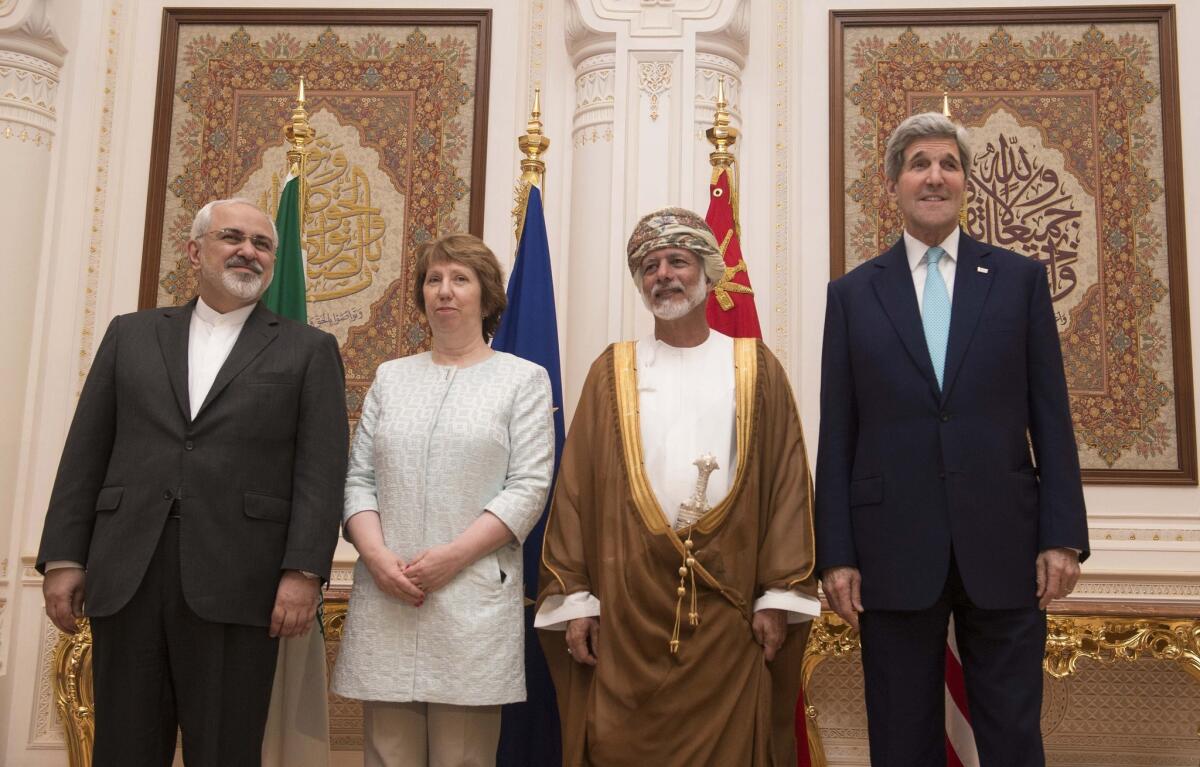Obama urges caution as final push begins on Iran nuclear talks

President Obama sounded a cautious note Sunday on the outlook for negotiations over Iran’s nuclear program, as Secretary of State John F. Kerry and Iranian Foreign Minister Mohammad Javad Zarif met in Oman to begin a final two-week push to seal a historic deal.
“There’s still a big gap,” Obama said in a taped interview on CBS’ “Face the Nation.” “We may not be able to get there.”
While Iran and a six-country negotiating group remain far apart on key issues, U.S. officials have in recent weeks intensified their efforts to achieve a breakthrough by floating new proposals and initiating moves to build pressure on Iran for concessions.
The final series of talks officially began just before noon local time as Kerry and Zarif, joined by European Union envoy Catherine Ashton, met at the Al Bustan Palace on the Sea of Oman in the Omani capital of Muscat. They are to meet again Monday.
The stakes for the administration are enormous. A successful deal could help redeem Obama’s foreign policy record; aides have said it would be as important for Obama’s legacy as his healthcare initiative.
The two sides are continuing to search for a formula that would prevent Iran from racing to achieve the capability of making a nuclear bomb, while also satisfying Iran’s demands to continue expanding its nonmilitary nuclear activities.
The two major unresolved issues are how much uranium enrichment capability Iran would be allowed to maintain, and the pace at which the West would remove the sanctions that have been damaging the country’s economy.
But from the Western perspective, the real goal now is not more incremental steps on technical points, but a major decision by Iran’s conservative elite to give more ground. With that goal in mind, Obama last month wrote a letter to Iranian Supreme Leader Ayatollah Ali Khamenei urging him to come to terms on a deal.
If Iran won’t agree to key concessions, the most likely outcome is an agreement that would claim that progress was made in the talks and arrangements to continue them next year. But advocates for a deal, including some U.S. officials, have argued that that it will become more difficult in the future for the two sides to make the concessions necessary for a broad agreement that could finally resolve the decade-old dispute.
A new ingredient in the talks is the growing role of Kerry, the administration’s most avid dealmaker.
For much of Obama’s six years in office, the issue has been handled by a small inner circle of diplomats and nuclear experts. But Kerry, a strong believer in personal negotiation, has been eager to play a larger part.
The final round begins with critics of the yearlong diplomatic effort, including Israel, Arab states and many U.S. lawmakers, worried that the Obama administration may go too far in its desire to seal a deal.
Israeli Prime Minister Benjamin Netanyahu, speaking Sunday before a cabinet meeting, said Israel would not agree to a deal that leaves Iran close to achieving a bombmaking capability.
“The international community now faces a simple choice: to give in to the demands of Iran in an agreement of surrender … or to stand firm on the demand that Iran dismantles its capability to manufacture nuclear weapons,” Netanyahu told ministers.
------------
FOR THE RECORD
Nov. 10, 6:58 a.m.: An earlier version of this post incorrectly quoted Israeli Prime Minister Benjamin Netanyahu as calling for the international community to “stand firm on the demand that Israel dismantles its capability to manufacture nuclear weapons.” He in fact was talking about Iran’s nuclear capability.
------------
Republican senators, who will take control of the chamber in January, are also signaling they would try to halt a deal they consider too lenient.
Sen. Lindsey Graham (R-S.C.), who will head the Senate Appropriations foreign operations subcommittee in the new Congress, told a pro-Israel group Saturday that if he finds any deal lacking, “I will kill it.”
More to Read
Start your day right
Sign up for Essential California for news, features and recommendations from the L.A. Times and beyond in your inbox six days a week.
You may occasionally receive promotional content from the Los Angeles Times.







